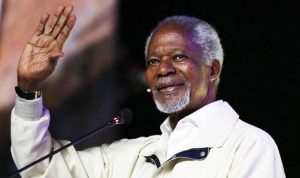(Akiit.com) Kofi Annan made his transition in August. The seventh Secretary-General of the United Nations, he worked up from the lower ranks (starting at age 24) of the international organization, to serve as head of peacekeeping operations, and four years into his term as UN Secretary-General, earning the Nobel Peace Prize. Annan, born in the kente-weaving province of Kumasi, Ghana, was the first African to lead the United Nations. After leading the UN for a decade, he continued to serve the world in a peacekeeping role through his foundation and in a leadership role in the Elders, a peacekeeping group.
Kofi Annan’s contributions to the United Nations are twofold, in my opinion. First, he was committed to peace, and to the UN’s peacekeeping role. He saw human rights as more important than “state sovereignty” and felt that the UN had a role in maintaining citizen rights in the face of state brutality. To be sure, he failed to recognize the threat to human rights in Rwanda (as did the Clinton administration and the rest of the world). Still, he expanded the role of the United Nations by asserting the importance of human rights.
Kofi Annan’s second significant contribution was his expanded definition of human rights, which included the fight against global poverty, global warming and AIDS. In other words, he felt that human rights included the right for us all to live in a better world, and he focused on the ways that predatory global capitalism shaped the ways many in the developing world lived. Annan, the consummate diplomat, would not use the same[ words that I have. But he was passionate in advancing the vision of global politics that was both peaceful and expansive.
In these moments after his transition, African Americans must celebrate the legacy of Kofi Annan. We must commemorate an African man with a global vision by widening our lens to acknowledge our global view of, in the words of the late Dr. Ron Walters (the dean of African American political science) “foreign policy justice”. Walters decried inconsistencies in US foreign policy, in the many ways that some nations were favored and others were not, with Israel often having too preferred a status compared to Palestinian nations , as well as the uneven ways our country chose to intervene in country conflicts. Through the lens of Walters, too little conversation about foreign policy justice took place, and African Americans were too often missing when these conversations took place.
Walters was among those who felt that African American people needed to be more fully involved in the development of US foreign policy, not only around Africa but in general. He was a trusted advisor to Rev. Jesse Jackson, a longtime political science professor at Howard University (and later at the University of Maryland), and a prolific writer and speaker. He embraced the legacy of Kofi Annan and the vision of Afroglobalism. When we embrace Annan, we also recognize the many ways that Dr. Ron Walters was pivotal in lifting awareness of African American people around global issues.
Both Annan and Walters were born in 1938, both would have turned 80 this year (Walters made his transition in 2010). Both provided a foundation of critical thinking around foreign policy issues and foreign policy justice. Thanks to Walters, African Americans embraced foreign policy issues more closely and critically. Thanks to Kofi Annan, the United Nations began to look at human rights more globally.
I do not hesitate to celebrate the legacy of Kofi Annan, a legacy that the Nobel Prize committee was “an excellent representative of the United Nations and probably the most effective secretary-general in its history.” At the same time, when I celebrate Annan’s legacy, I remember the legacy of Dr. Ron Walters, the civil rights activist (leading sit-ins in his hometown of Wichita, Kansas), iconic political science professor, and pioneering political activist and advisor to leaders, and submit that his legacy should motivate African Americans to be more fully committed to foreign policy justice. Two men, Secretary-General Kofi Annan and Professor Ron Walters, embraced the vision of a safe, peaceful, equitable world and must be celebrated for it. Their legacy is in contrast to US leadership where our 45th President sows dissent and disparages the countries Annan and Walters so loved as “shithole” countries.
Columnist; Julianne Malveaux
FB Page; http://facebook.com/julianne.malveaux









Leave a Reply